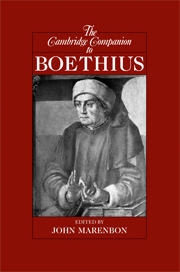Book contents
- Frontmatter
- Introduction: reading Boethius whole
- Part 1 Before the Consolation
- 1 Boethius’ life and the world of late antique philosophy
- 2 The Aristotelian commentator
- 3 The logical textbooks and their influence
- 4 Boethius on utterances, understanding and reality
- 5 The Opuscula sacra: Boethius and theology
- 6 The metaphysics of individuals in the Opuscula sacra
- 7 The medieval fortunes of the Opuscula sacra
- Part II The Consolation
- Appendix: Boethius’ works
- Bibliography
- Index: References to Boethius' works
- General Index
- Series list
4 - Boethius on utterances, understanding and reality
from Part 1 - Before the Consolation
Published online by Cambridge University Press: 28 July 2009
- Frontmatter
- Introduction: reading Boethius whole
- Part 1 Before the Consolation
- 1 Boethius’ life and the world of late antique philosophy
- 2 The Aristotelian commentator
- 3 The logical textbooks and their influence
- 4 Boethius on utterances, understanding and reality
- 5 The Opuscula sacra: Boethius and theology
- 6 The metaphysics of individuals in the Opuscula sacra
- 7 The medieval fortunes of the Opuscula sacra
- Part II The Consolation
- Appendix: Boethius’ works
- Bibliography
- Index: References to Boethius' works
- General Index
- Series list
Summary
In this chapter, we will look at the three elements that form the basis of the theory of signification for Boethius, namely expressions, understanding and reality, and their relation to one another. Boethius did not write separate treatises on the philosophy of language, cognition or metaphysics. Instead, he wrote commentaries on Aristotelian logic. By the time he began to work on them around the start of the sixth century, the texts of Aristotelian logic were read in a fixed sequence: the first three were the Isagoge, Categories and On Interpretation, and Boethius treated topics as and when they are discussed in these texts by Porphyry and Aristotle. To grasp Boethius' theory of signification, we must therefore gather his views on utterances, understanding and reality from a variety of places in his commentaries and put them together. As evidenced by the sheer length of the treatment of Aristotle's brief comments on signification in his commentaries on On Interpretation, there is no question but that Boethius was aware of the importance of a theory of signification in explaining how the words we use are able to make sense to others and to refer to reality. We might expect, therefore, that Boethius' views on language broadly cohere with his theory of cognition and metaphysics given elsewhere in the commentaries on the Isagoge and Categories.
- Type
- Chapter
- Information
- The Cambridge Companion to Boethius , pp. 85 - 104Publisher: Cambridge University PressPrint publication year: 2009
- 2
- Cited by



